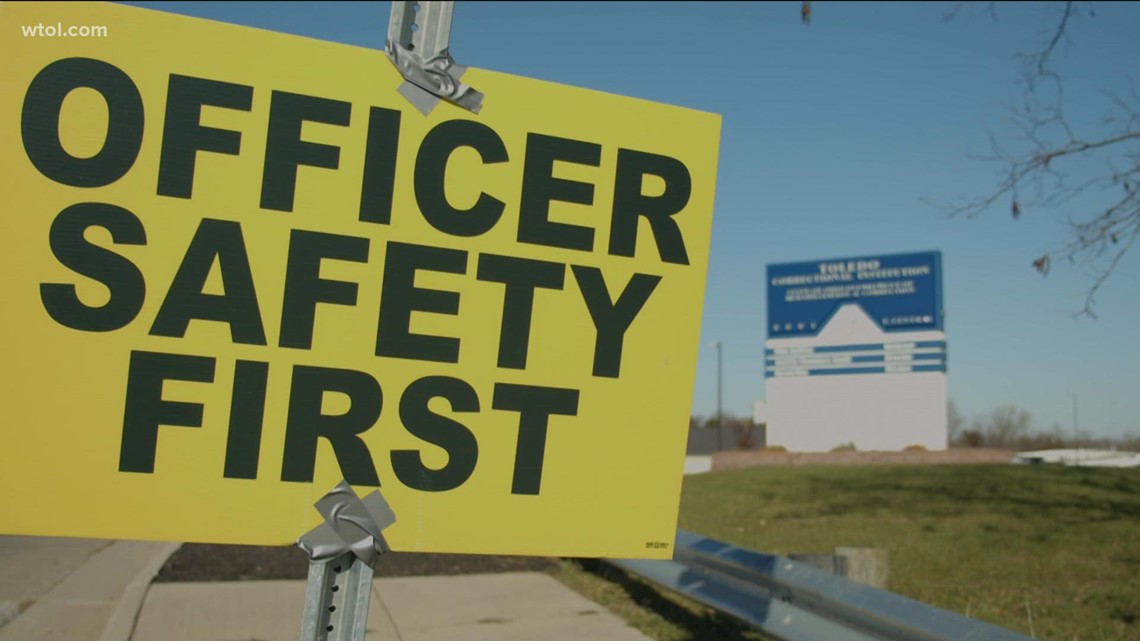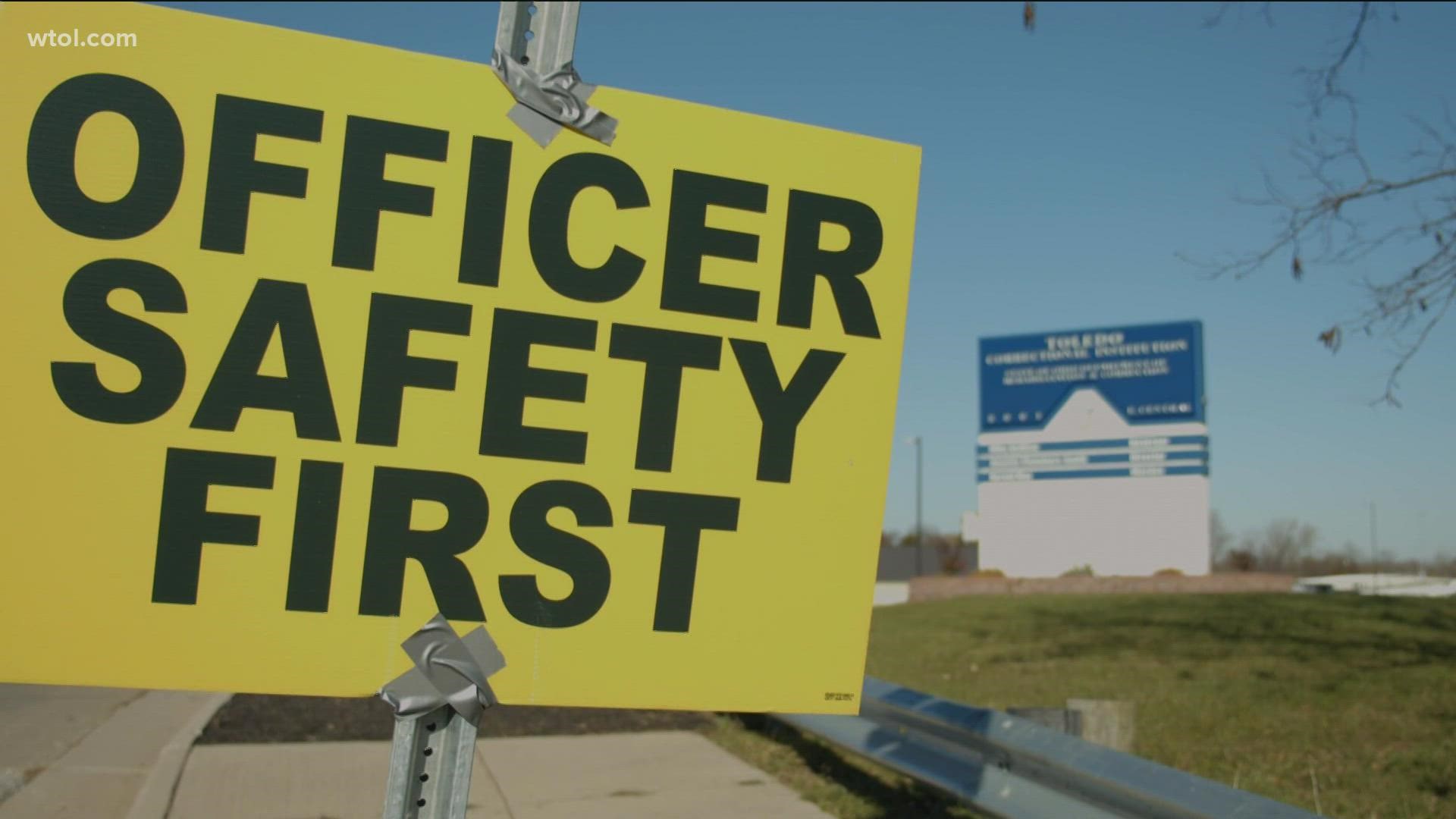11 Investigates: Sexual misconduct against guards pervasive at Toledo Correctional
The city of Toledo says none of 868 incidents in 2021 were presented for prosecution.

On Nov. 1, 2021, a female corrections officer was on “constant watch” at Toledo Correctional Institution.
It’s a dreaded duty that means exactly what it says. A prisoner is deemed suicidal and the officer needs to constantly watch him.
As she watched, the inmate pushed aside his “suicide gown” and exposed himself to the guard and began to manipulate his penis.
She called for support. A male officer arrived and ordered the inmate to stop. After he left, the inmate cursed at the female guard and told her, “just for that, I’m going to [do this] all night long.”
And he did, and the officer was forced to watch.
In 2021, more than 850 similar incidents happened at Toledo Correctional. None of the incidents resulted in prosecution.


Rule 14 violations A disturbing trend
When an inmate is taken into custody at a state prison, they are given a handbook.
A Rule 14 violation in that handbook is defined as “seductive or obscene acts, including but not limited to: including indecent or masturbation; including, but not limited, to any word, action, gesture or other behavior that is sexual in nature and would be offensive to a reasonable person.”
There were 4,259 violations at Ohio prisons last year. There were 868 at Toledo Correctional. In 2019, there were 3,853 and 781, respectively. There were 3,469 sent to the rules infraction board - the most serious charges - in 2021 in Ohio and 2,225 in 2019. For Ohio, those numbers were 609 last year and only 186 in 2019.
A key event, however, happened in the fall of 2019. Then-newly appointed Ohio Department of Rehabilitation and Corrections Director Annette Chambers-Smith addressed prison employees in a five-minute video message about Rule 14 infractions.
“At the end of the day, I just want everyone to know that I have zero tolerance for this. And I don't expect our people to put up with victimization. And I want them to know that we are continuing to try to work to do something about it,” she said.
In an email to 11 Investigates, ODRC spokesman JoEllen Smith credited Chambers-Smith’s focus on the issue as the reason that violations are up, saying employees are now emboldened to report harassment. She also said there has been about a 50 percent increase in cases heard by the rules infraction board. Before 2019, many cases were heard by hearing officers. A rules infraction board can hand out harsher penalties, such as loss of privileges or inmates being transferred to more secure or isolation housing.
However, one of Chambers-Smith’s goals was to change state law to toughen penalties. In Florida, repeated offenses can result in a felony conviction and being placed on the state’s sex-offender list. No new legislation has been passed in Ohio. Prisoners typically face few consequences for their actions, according to interviews.
State Rep. Paula Hicks-Hudson, D-Toledo, met with Chambers-Smith in December about the issue, and she told 11 Investigates that the city of Toledo can do more.
“I think the solution, which the director suggested, is that we use the ability of the municipal court, the city prosecutors, to accept charges filed by the personnel at the corrections facility and that those offenders have their day in court,” she said. “You don’t need to increase the punishment. You need to enforce the law.”
She said she would attempt to set up a meeting with the city after the interview. That meeting took place on Tuesday between Law Director Dale Emch, Toledo Chief Prosecutor David Toska, Hicks-Hudson and prison officials.
The city committed to prosecuting future incidents as public indecency cases. If an inmate exposes himself, it would initially be a fourth-degree misdemeanor. If he exposes himself and masturbates, a first offense would be a third-degree misdemeanor. Repeated offenses would elevate to a first-degree misdemeanor and up to an additional six months in prison.
“If the cases are brought before us by law enforcement or an individual, we will prosecute them,” Toska said.
Asked how many of the more than 850 violations were prosecuted last year, Toska said: “None to my knowledge.”
Asked why that was, he said: “It’s incumbent upon the prison to report. As with any case, they are driven by individual cooperation.”
According to a lawsuit filed a year ago in U.S. District Court, cooperation is something that simply isn’t happening at Toledo Correctional.
"Very lonely, unsupported" Guards take action, but has there been change?
By early last year, Toledo Correctional officers Carla Good and Suzanne Trowbridge could not take the abuse anymore.
Their January 2021 lawsuit against ODRC, Toledo Correctional supervisors and Chambers-Smith claimed “on a consistent and regular basis throughout plaintiffs’ employment at TOCI, plaintiffs have been and are subjected to sexual harassment and unwanted sexual advances by male inmates, which defendants know about or should have been aware of yet intentionally failed to take measures reasonably calculated to end or mitigate it.”
“I mean, just picture yourself having to look at a penis all day, every day, and watch someone masturbate. You tell them to stop. They continue for minutes and then finish and then they do it again later that day,” said Kera Paoff, a lawyer for the women. “And it's just kind of an all-day assault on your emotions.”


In November, guards picketed outside the prison to protest conditions. No members would go on camera, but off-camera they confirmed that guards are repeatedly subjected to sexual misconduct from inmates and that the victims are typically female guards. The numbers union members provided matched what ODRC provided to WTOL 11.
Female guards are particularly vulnerable during “constant watch” duties. Inmates understand that the guard must watch them. Guards are often subjected to vulgarities shouted at them while the inmate masturbates. In one report, an inmate repeatedly threatened to rape the guard if he caught her alone.
According to the lawsuit, Good was required to watch an inmate for six hours in July 2019. During that time, he repeatedly masturbated. The lawsuit says supervisors knew of the situation and refused to relieve her, and then the inmate received no punishment.
Despite inquiring multiple times over several weeks about an interview, WTOL 11 was told that Chambers-Smith would not be available to answer questions about the incidents. TOCI said it would check with the state but eventually did not respond. Instead, the state provided an extensive email, giving its explanation for the increase in Rule 14 violations and the five-minute video message Chambers-Smith produced in late 2019. The highlights of that video were that the incidents would not be tolerated, officers would be supported, and that there was a push underway for legislation to increase penalties.
When asked if there has been a change in attitude at TOCI since the director’s message, Paoff replied: “My clients haven’t seen any change.”
She says her clients feel “very lonely, unsupported.”


But there was another element of Chambers-Smith’s strategy to combat Rule 14 violations.
“Another thing that we did was Senate Bill 201, which you may have heard of is the Tokes legislation. It does give us the ability to add time for offenders under that law for certain types of violations. I can let you know that I made sure that Rule 14 was one of those violations.”
But now, that element of the law is under legal attack, and northwest Ohio is at the center of the attack.
The Tokes Act An "alarming development"
On Feb. 8, 2017, Monclova Township native and Ohio State University senior Reagan Tokes was abducted and killed in Columbus by Brian Golsby, who had recently been released from prison for a 2010 rape and abduction of a pregnant woman. While in prison, he committed dozens of infractions and was transferred multiple times. After his release, he committed several additional crimes while on probation.
The family eventually filed a lawsuit, claiming that Golsby was not adequately supervised by the state, even though it had the ability to track him through an ankle monitor. That lawsuit was eventually settled.
But based on the case, the Reagan Tokes Act – Senate Bill 201 – was introduced. It became law in December 2018. The law allows a judge to sentence certain felony defendants to a minimum and maximum term. If it’s for a single offense, an additional 50 percent can be added to make a maximum term. The state also has the ability to reduce the sentence because of exceptional behavior. Once the minimum term is served, the ODRC holds a hearing to decide if the inmate behaved well enough during his term to be released. Rule 14 violations can be used against the inmate, resulting in a longer-term. The ODRC alone has the power to retain the inmate for additional time.
“We have seen in my practice - I'm not saying every prisoner, or every prison guard or every institution is like this - but we've seen sexual exploitation of prisoners, physical abuse toward prisoners, guards that demand protection money from prisoners,” said Perrysburg attorney Andy Mayle. “So now that the prison department has this power, the prison department is going to rely upon the individual - the guards - to update them on how the inmates are doing. That just lends itself to great potential exploitation.”
Mayle is representing local man Edward Maddox, who was convicted of burglary and was sentenced to a minimum of four years and a maximum of six years. Mayle argued before the Ohio Supreme Court in June. The question before the justices is whether the case can be argued before Maddox has finished his minimum sentence, which began in 2020. In other words, is the case “ripe” for appeal. Mayle contends unconstitutional is unconstitutional, no matter if actual harm has yet to be done with an extended sentence. The decision is expected any day and dozens of defendants with similar lawsuits are anxiously waiting for the result.
“You have prison officials who weren't elected, who aren't necessarily attorneys or have any legal background whatsoever, making these choices to keep people incarcerated behind bars without any judicial review whatsoever. That is an alarming development to me,” Mayle said.
If Maddox prevails, a tool against Rule 14 violations will be lost.
A search for a solution Hope for consistent punishment
Although there is no current legislation pending on stiffening penalties for Rule 14 violations, Hicks-Hudson did tell us she would consider it if it is eventually needed.
“But you don't need to increase the punishment. You need to enforce the law and by enforcing the law, that would serve as another infraction for that person who's already in the penal system,” Hicks-Hudson said.
It is a sentiment shared by Mayle, who emphasized that he is not anti-punishment, but he is pro-Constitution.
“If the prison officials contend that the violation is a crime, then the proper way would be to record that to your county prosecutor and ask for the county prosecutor - or if it's a misdemeanor, the municipal prosecutor - to prosecute that,” Mayle said. “The prison officials are the last people in the world who should be deciding how long an inmate should remain in prison.”
Inside the prison system, Smith emphasized the increased attention the cases are receiving. She said this is evidenced by the large increase in hearings before rules infraction boards.
But, again, TOCI reported no Rule 14 violations to Toledo for prosecution in 2021. It’s not known if they did prior to that.
For Paoff and her clients, they want consistent punishment that can entice prisoners to behave better.
“The goal is to implement some change so that this staff is not subjected to this harassment all day, every day,” Paoff said. “One of the things that needs to be done is consistent discipline and enforcing the policies that they do have in place. You know, a slap on the wrist isn't going to stop someone from harassing females.”


More on WTOL:


